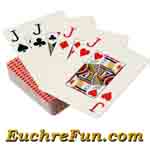
|
| « GAMES INDEX | History of Playing Cards | Early Standards | Gallery of Playing Cards | Card Backs |
Panguingue
Panguingue is a card game of the Rummy family, a multiplayer extension of Conquian, designed specifically as a gambling game which accommodates as many as fifteen players.
Number of Players:
Although Panguingue can be played by as few as four players, it's not really worth playing with any fewer than 6, 7 or 8 players. An odd number of players is all okay, since there are no partnerships — each player plays for themselves.
Stakes:
Each player should be issued with an equal number of chips. These will be used to pay other players in accordance with the rules.
The Cards:
Take six to eight standard decks and remove all the 8s, 9s and 10s. This will give you a deck of 40 cards — with six decks that's 240 cards, and eight decks 320 cards.
For the purposes of melding sequences, cards rank from high to low: K, Q, J, 7, 6, 5, 4, 3, 2, A.
The Draw:
A portion of the deck is shuffled and spread face down. Players draw and the lowest card deals first but has choice of seat. If two players tie for lowest, those two draw again and the lowest of them will be the first dealer.
The Shuffle:
In Panguingue, traditionally deal and play go anti-clockwise. Before the first deal all the multiple decks are shuffled together thoroughly. It is customary for the player to the Dealer's left to shuffle. As there are so many cards, after each hand, the discards are gathered up, shuffled and placed at the bottom of the stock, providing fresh, unseen cards, for the next round.
The Deal:
Deal and play are anti-clockwise. The Dealer deals out 10 cards to each player in two rounds of batches of five, beginning with the player to the Dealer's right. As there are so many cards, the Dealer ought to pick up just the top quarter of so of the deck - as many as can be properly handled in hand - and once having dealt, return the excess to the top of the pack once the deal is complete.
Once the deal is complete, the rest of the pack is placed face down at the center of the table to form the stock. It is customary, just to place the top half of the pack — "the head" — in the center of the table, and the bottom half — "the foot" — to one side. It can be used to replenish the stock if "the head" is exhausted. The top card of the stock is then turned face up and placed beside the stock to begin the discard pile.
Going on Top:
Before play begins, each player beginning with the player to the Dealer's right declares whether they will stay in or drop out. A player may choose to drop out if they decide they are not happy with their hand. By so doing, such a player will pay a forfeit penalty, usually two chips, which are collected and placed on top of the foot — hence the term "Going on Top". These amounts are paid to the player who "goes out" winning the hand. These players' cards are kept separate, out of play, and not returned to the deck until the end of the hand. Such a player takes no further part in play or payment for that hand.
Objective of the Game:
The objective of the game is to be the first player to go out by melding all 11 cards in hand — i.e. the 10 in hand plus the one discard.
The Play:
Beginning with the player to the Dealer's right, each player takes it in turn to draw a card from the stock or the discard pile, meld if he/she can, and discard one card face up to the discard pile.
Note these important rules:
- A player may only draw from the discard pile if the face up card is:
- Drawn from the stock by the previous player; and
- Can immediately be melded with cards in the player's hand according to the melding rules.
- When a player draws a card from the stock, he/she must immediately meld the card or discard it. He/she cannot put it in his/her hand and discard another card — except when the card matches a meld of the opponent to his/her immediate right, and such an opponent has already melded 10 cards. In such as case the player can keep it in hand, and discard another card.
- After drawing and before discarding, a player may meld as many sets as he/she holds, or add to any of his/her existing melds.
- The player complete their turn by discarding to the discard pile.
Melds:
A meld made must consist of exactly three cards. A meld may be extended upon in subsequent turns, and may be extended to as many as eleven cards. But as initially played, a meld is laid out as exactly three cards.
Melds are of two kinds: Sequences and Sets.
Sequence: A Sequence is a run of any three cards of the same suit. Sequences can be extended to as many as eleven cards.
Set: A Set is three cards of the same rank and of different suits. And each suit must be different. e.g. Q♥, Q♠, Q♣, but not Q♥, Q♣, Q♣
Matched Set: A set of three cards of the same rank and of the same suit. e.g. Q♥, Q♥, Q♥.
Kings and Aces are exceptions. Any three Kings and any three Aces can be melded as a Set. K♥, K♣, K♣, or A♥, A♥,A♦, would be acceptable, as examples.
Conditions:
Certain melds are called "conditions", and on melding such a player immediately collects chips from all the other players. All 3s, 5s and 7s are "valle" cards, meaning cards of value. All other cards are "non-valle".
The following conditions apply:
- Any set of valle cards not in the same suit collects 1 chip from every player.
- Any set of valle cards in the same suit collects 2 chips from every player — 4 chips if that suit is Spades.
- Any set of non-valle cards in the same suit collects 1 chip from every player, 2 chips if in Spades.
- Any sequence of A, 2, 3 in the same suit collects 1 chip from each player, 2 chips if in Spades.
- Any sequence of J, Q, K in the same suit collects 1 chip from each player, 2 chips if in Spades.
Increasing Melds:
As mentioned above, a player may add more cards to any of their melds, provided that the character of the meld is preserved. For example, if the meld is matched set, say Q♣, Q♣, Q♣, then he may add another Q♣ to extend the meld. Likewise, if the set is Q♥, Q♠ Q♣, then he may only add a Q♦ to extend the meld in keeping with its character.
When cards are added to a "condition" meld, the player collects the value of the original condition from each player for each additional card he/she adds, with the exception that if the condition is a set of valle cards in the same suit, then the collection is only 1 chip (not 2) and if in Spades, then 2 chips (not 4).
Furthermore, with the addition of cards, one meld may be split into two, provided that each new part forms a valid meld in itself. If by so doing, the player creates from one, two new conditions, he/she collects payment from each player accordingly.
Forcing Cards:
If the top card of the discard pile can be added to a meld of the player playing in turn, any other player may order him/her to take up such a discard, thus forcing the player to take it up and meld it accordingly.
Going Out:
Once a player shows 11 cards in melds, he/she "Goes Out" — thus winning the had. The player thereby collects from each active player the value of each condition in his/her melds all over again; collects 1 more chip from each player who dropped out; and takes the pool placed "on top" from each player who dropped out at the beginning of the hand.
The Deal Proceeds:
The deal now proceeds to the player sitting at the winner's left. This will ensure that the winner is "first hand", that is, the player immediately to the Dealer's right, and first to play in the next hand.
Game:
Panguingue is played over any number of hands. The winner of the game is the player with the largest stack of chips at the end of play.
L I N K S
Panguingue Card Game Rules - Rummy-Games.com
Panguingue - The Card Games Webstie
Panguingue (Pan) - Denexa Games
| Complete Index of Card Games » |
|||||||||||||||
|
|||||||||||||||
|
|||||||||||||||
| |||||||||||||||
| |||||||||||||||
|
|||||||||||||||
| |||||||||||||||
|
|||||||||||||||
| |||||||||||||||
|
|||||||||||||||
| Complete Index of Card Games » |


| « Games Index | History of Playing Cards | Early Standards | Gallery of Playing Cards | Card Backs |

|
|
|